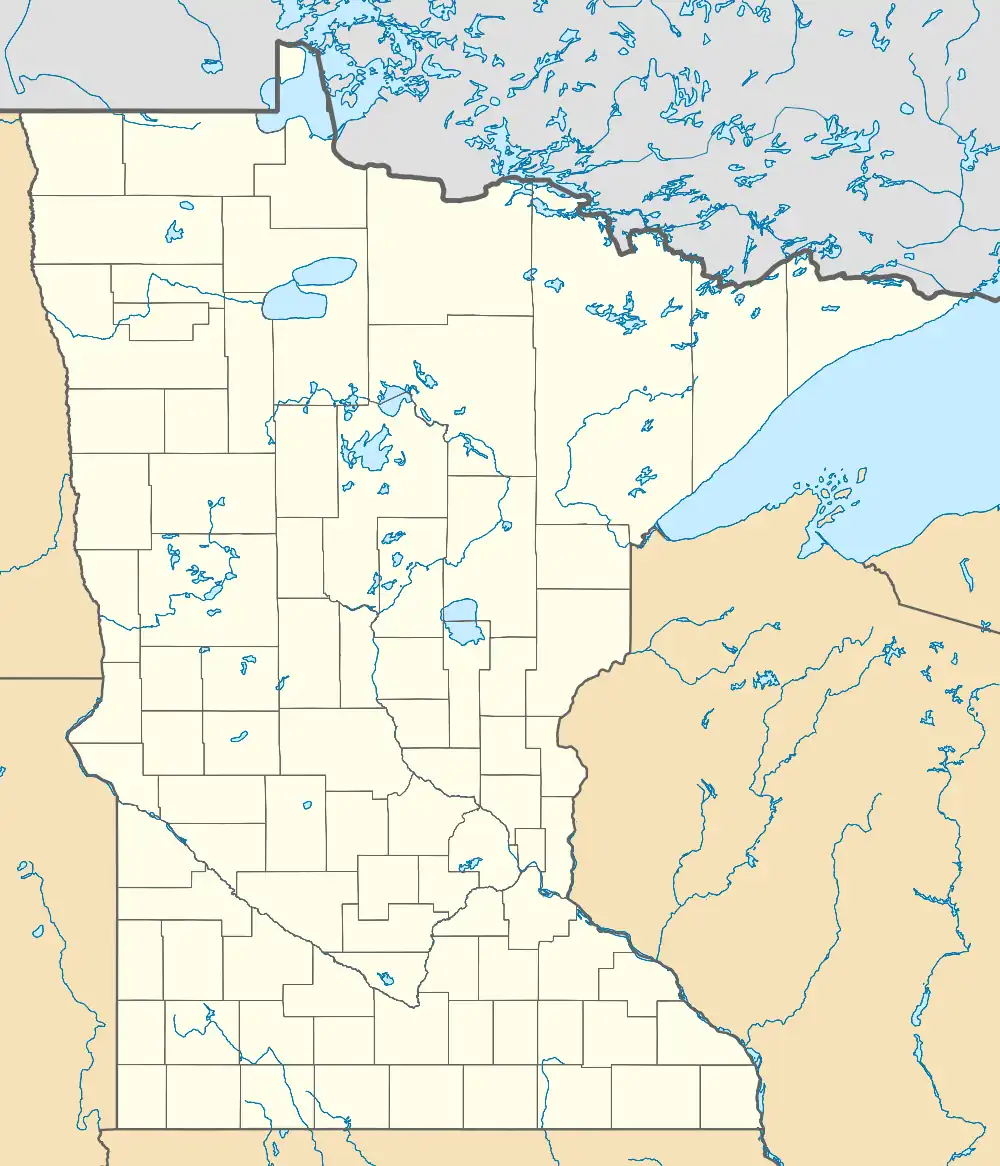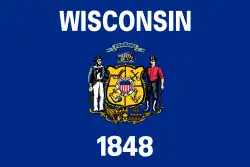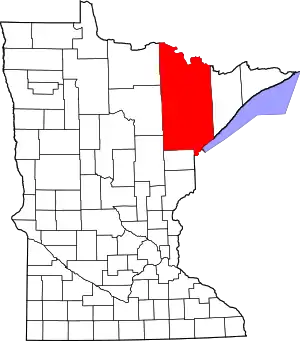Rice Lake | |
|---|---|
 Rice Lake Location of the city of Rice Lake within Saint Louis County, Minnesota | |
| Coordinates: 46°52′45″N 92°7′12″W / 46.87917°N 92.12000°W | |
| Country | United States |
| State | Minnesota |
| County | Saint Louis |
| Founded | 1870 |
| Incorporated | October 22, 2015 |
| Government | |
| • Mayor | John Werner |
| • Council | Suzanne Herstad Bob Quade Jayme Heim John Hegstrom |
| Area | |
| • Total | 33.15 sq mi (85.85 km2) |
| • Land | 32.10 sq mi (83.15 km2) |
| • Water | 1.04 sq mi (2.70 km2) |
| Elevation | 1,378 ft (420 m) |
| Population | |
| • Total | 4,112 |
| • Estimate (2021)[3] | 4,101 |
| • Density | 128.08/sq mi (49.45/km2) |
| Time zone | UTC-6 (CST) |
| • Summer (DST) | UTC-5 (CDT) |
| ZIP codes | 55803 |
| Area code | 218 |
| FIPS code | 27-54060[4] |
| GNIS feature ID | 0000000[5] |
| Website | ricelakecitymn.com |
Rice Lake is a city in Saint Louis County, Minnesota, United States. The population was 4,112 at the 2020 census.[2]
Main routes include Rice Lake Road (County Road 4) and Martin Road (County Road 9).
Rice Lake Road runs north–south, and Martin Road runs east–west. Other routes include Howard Gnesen Road, Arnold Road, Calvary Road, West Tischer Road, and West Beyer Road.
History
Rice Lake was founded as a township in 1870.
After portions of the township had been annexed by the city of Duluth, the residents began the process to be recognized as a city.[6] On August 20, 2015, Administrative Law Judge Barbara J. Case signed an Order of Incorporation which allowed the township of Rice Lake to convert into the city of Rice Lake.[7][6][8]
In an election held on October 13, 2015, Rice Lake residents elected a mayor and members of the city council.[6][8] The results of the election were certified. The township was formally organized as a city on October 22, 2015.[9]
Geography
According to the United States Census Bureau, the township has a total area of 33.5 square miles (87 km2); 32.3 square miles (84 km2) is land and 1.1 square miles (2.8 km2), or 3.43%, is water.
Wild Rice Lake is partially located within the city of Rice Lake.
Amity Creek and the East Branch of Amity Creek both flow through the city.
The Lester River rises in nearby Gnesen Township and flows generally southeastwardly through the city of Rice Lake and Lakewood Township, turning southward as it nears Lake Superior. The river flows into Lake Superior in eastern Duluth.
Adjacent townships, cities, and communities
The following are adjacent to Rice Lake:
- Canosia Township (west)
- Lakewood Township (east)
- Gnesen Township (north)
- Fredenberg Township (northwest)
- Normanna Township (northeast)
- The city of Duluth (south)
- The neighborhood of Duluth Heights (south)
- The neighborhood of Kenwood (south)
- The neighborhood of Woodland (southeast)
The Duluth International Airport is to the immediate southwest of the city of Rice Lake.
Ridgeview Road runs east–west along Rice Lake's southern boundary line with adjacent city of Duluth.
Lismore Road runs east–west along Rice Lake's northern boundary line with adjacent Gnesen Township.
Jean Duluth Road (County Road 37) runs north–south along Rice Lake's eastern boundary line with adjacent Lakewood Township; except for the southeast corner of Rice Lake where both Arnold Road and Martin Road together serve as the boundary line with adjacent city of Duluth.
Town Line Road briefly runs north–south along Rice Lake's western boundary line with adjacent Canosia Township.
Demographics
| Census | Pop. | Note | %± |
|---|---|---|---|
| 1880 | 63 | — | |
| 1890 | 169 | 168.3% | |
| 1900 | 231 | 36.7% | |
| 1910 | 580 | 151.1% | |
| 1920 | 916 | 57.9% | |
| 1930 | 1,573 | 71.7% | |
| 1940 | 2,300 | 46.2% | |
| 1950 | 2,838 | 23.4% | |
| 1960 | 3,615 | 27.4% | |
| 1970 | 3,359 | −7.1% | |
| 1980 | 3,861 | 14.9% | |
| 1990 | 3,883 | 0.6% | |
| 2000 | 4,139 | 6.6% | |
| 2010 | 4,099 | −1.0% | |
| 2020 | 4,112 | 0.3% | |
| 2021 (est.) | 4,101 | [3] | −0.3% |
| U.S. Decennial Census[10] 2020 Census[2] | |||
2000 census
As of the census of 2000, there were 4,139 people, 1,494 households, and 1,177 families residing in the township. The population density was 127.9 inhabitants per square mile (49.4/km2). There were 1,518 housing units at an average density of 46.9 per square mile (18.1/km2). The racial makeup of the township was 97.83% White, 0.29% African American, 0.58% Native American, 0.24% Asian, 0.10% Pacific Islander, 0.10% from other races, and 0.87% from two or more races. Hispanic or Latino of any race were 0.41% of the population.
There were 1,494 households, out of which 37.3% had children under the age of 18 living with them, 68.8% were married couples living together, 6.2% had a female householder with no husband present, and 21.2% were non-families. 16.8% of all households were made up of individuals, and 5.3% had someone living alone who was 65 years of age or older. The average household size was 2.77 and the average family size was 3.10.
In the township the population was spread out, with 27.5% under the age of 18, 7.2% from 18 to 24, 31.0% from 25 to 44, 24.9% from 45 to 64, and 9.4% who were 65 years of age or older. The median age was 38 years. For every 100 females, there were 103.1 males. For every 100 females age 18 and over, there were 104.9 males.
The median income for a household in the township was $51,341, and the median income for a family was $55,357. Males had a median income of $39,894 versus $28,095 for females. The per capita income for the township was $18,857. About 4.7% of families and 5.5% of the population were below the poverty line, including 4.9% of those under age 18 and 6.5% of those age 65 or over.
Politics
| Year | Republican | Democratic | Third parties |
|---|---|---|---|
| 2020[11] | 47.0% 1,290 | 51.0% 1,401 | 2.0% 55 |
| 2016[12] | 44.5% 1,090 | 47.6% 1,167 | 7.9% 194 |
| 2012[13] | 36.5% 894 | 61.4% 1,503 | 2.1% 51 |
| 2008[14] | 36.0% 892 | 61.9% 1,536 | 2.1% 53 |
| 2004[15] | 37.1% 912 | 62.2% 1,528 | 0.7% 16 |
| 2000[16] | 33.9% 727 | 59.2% 1,269 | 6.9% 148 |
References
- ↑ "2020 U.S. Gazetteer Files". United States Census Bureau. Retrieved July 24, 2022.
- 1 2 3 "Explore Census Data". United States Census Bureau. Retrieved March 15, 2023.
- 1 2 "City and Town Population Totals: 2020-2021". United States Census Bureau. March 15, 2023. Retrieved March 15, 2023.
- ↑ "U.S. Census website". United States Census Bureau. Retrieved January 31, 2008.
- ↑ "US Board on Geographic Names". United States Geological Survey. October 25, 2007. Retrieved January 31, 2008.
- 1 2 3 "Rice Lake Township is Minnesota's newest city". Mesabi Daily News. August 24, 2015. Retrieved October 15, 2015.
- ↑ Case, Barbara J. (August 20, 2015). "Order: In the Matter of the Petition for Incorporation of Rice Lake Township" (PDF). State of Minnesota. Retrieved October 15, 2015.
- 1 2 Turtinen, Melissa (August 24, 2015). "Let's make it 853: Rice Lake Township will be Minnesota's newest city". Bring Me the News. Retrieved October 15, 2015.
- ↑ "Rice Lake City Council holds first meeting". Duluth News Tribune. Duluth, Minnesota. October 22, 2015. Retrieved October 29, 2015.
- ↑ United States Census Bureau. "Census of Population and Housing". Retrieved September 11, 2013.
- ↑ "Minnesota Secretary of State - 2020 Precinct Results Spreadsheet".
- ↑ "Minnesota Secretary of State - 2016 Precinct Results Spreadsheet".
- ↑ "Minnesota Secretary of State - 2012 Precinct Results Spreadsheet".
- ↑ "Minnesota Secretary of State - 2008 Precinct Results Spreadsheet".
- ↑ "Minnesota Secretary of State - 2004 Precinct Results Spreadsheet".
- ↑ "Minnesota Secretary of State - 2000 Precinct Results Spreadsheet".


